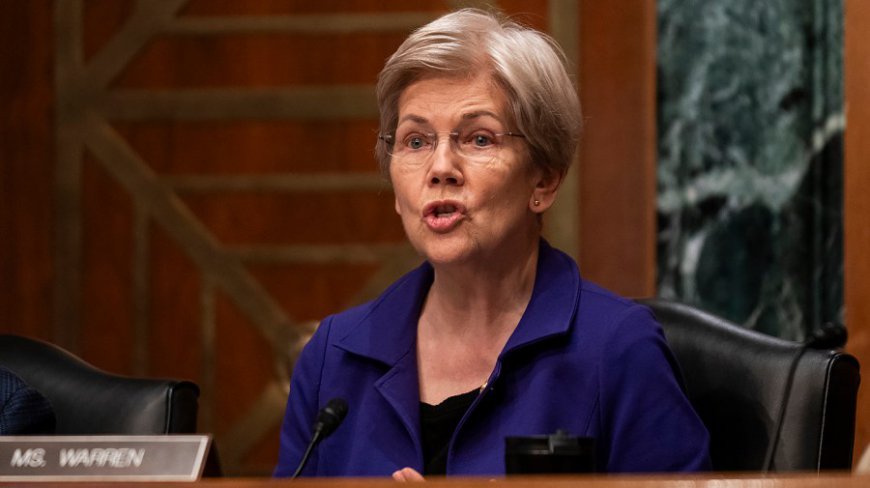Top Senate banking Democrat sounds alarm over Fed leverage proposal
The Senate banking committee’s top Democrat is calling on the Federal Reserve to throw out a proposed rule for the amount of money that big banks are allowed to borrow relative to their capital. Sen. Elizabeth Warren (D-Mass.) said in a letter sent this week to the Fed’s vice chair for supervision, Michelle Bowman, that...

The Senate banking committee’s top Democrat is calling on the Federal Reserve to throw out a proposed rule for the amount of money that big banks are allowed to borrow relative to their capital.
Sen. Elizabeth Warren (D-Mass.) said in a letter sent this week to the Fed’s vice chair for supervision, Michelle Bowman, that the Fed’s plan to loosen its leverage ratio rule would make banks less stable and weaken the financial system.
The proposal would “[reduce] capital available for lending, protecting depositors, and preventing megabank failures,” Warren wrote.
She cautioned against loosening financial regulations following the 2023 collapse of Silicon Valley Bank due to interest rate exposure, which led to the successive failures of Signature Bank and First Republic Bank.
The collapse almost tanked the financial system and blurred the lines between the public and private sector. First Republic was bailed out by its ostensible competitors under the auspices of the Treasury, which extended a line of credit to banks backstopped by U.S. taxpayers.
The Federal Deposit Insurance Corporation also insured Silicon Valley Bank’s depositors way over the $250,000 limit, saving the well-heeled clientele of one of the economy’s most prosperous sectors.
Warren said in her letter that former Fed supervision boss Randal Quarles still hadn’t owned up to his mistakes regarding the collapse.
“Randal Quarles … still refuses to take accountability for implementing the deregulatory agenda that contributed to Silicon Valley Bank’s collapse,” she wrote in the letter.
The Fed floated the rule change to its borrowed-money ratio last month. Big banks currently have to hold about 5 percent of the money they borrow while slightly smaller banks have to hold 3 percent.
The Fed has argued that 5 percent is overly restrictive and that lowering the number would free up banks to buy more bonds.
The proposed changes would let big banks “engage in lower-risk, lower-return activities, such as U.S. Treasury market intermediation, which would in turn support functioning of the U.S. Treasury market,” the Fed said in June.
Banks are supportive of the change, calling reductions in their capital “immaterial.”
“Aggregate reductions in bank capital remain immaterial,” the Bank Policy Institute said in a statement last week. “[Bank] holding companies are expected to leverage the current resolution process to deploy capital where it’s needed most.”
The proposed rule change comes as concerns mount over the size and trajectory of the U.S. public deficit, which is set to get a $3.3 trillion boost from Republicans’ new tax-and-spending cut law.
Some unconventional ideas have been circulating about how to address it, since Congress appears incapable of either raising taxes or cutting spending enough to send it on a downward path.
Sen. Ted Cruz (R-Texas) recently floated a proposal to get rid of interest payments on reserves that banks keep at the Federal Reserve.
Cruz told CNBC in June that getting rid of interest payments to banks could save $1 trillion.
“This is over a trillion dollars, big dollars in savings,” Cruz told Bloomberg News last month. “Half of it is going to foreign banks, which makes no sense.”
Some experts have been openly wondering whether the Fed’s leverage rule change could amount to a form of what’s called financial repression, which means inflating away the debt with negative real interest rates.
“Some have said that if they make this change, effectively it’s a form of financial repression because they’re expecting banks to hold more treasuries. Or it might just be a more efficient rule,” David Beckworth, a senior research fellow at the Mercatus Institute, told The Hill last week.
Others have put the situation in more dire terms.
“If we can’t cut the fiscal deficit, and we can’t repay the debt, and we don’t want to default … then they’ve got to manage a slow and consistent erosion of the debt through negative real rates,” Stephen Johnston, director of Omnigence Asset Management, told The Hill last month.
From 2020 to 2022, public debts fell as a share of GDP fell 3.6 percentage points due to the high post-pandemic inflation even as the U.S. was running very large deficits.
In her letter to Fed vice chair Bowman, Warren also took issue with the fact that main street businesses are not participating in the Fed’s upcoming conference on capital requirements while big banks will be there in force.
“JPMorgan, Goldman Sachs, Morgan Stanley, Bank of America, Wells Fargo, and other banks are featured on panels to opine on the capital requirements they have long lobbied to weaken,” she wrote.
What's Your Reaction?























